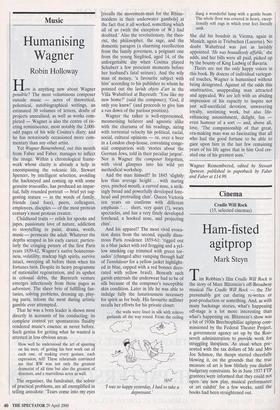Music
Humanising Wagner
Robin Holloway
How is anything new about Wagner possible? The most voluminous composer outside music — acres of theoretical, polemical, autobiographical writings, an estimated 30 volumes of letters, drafts of projects unrealised, as well as works com- pleted — Wagner is also the centre of riv- eting reminiscence, most notably the 2,000- odd pages of his wife Cosima's diary; and he has notoriously occasioned more com- mentary than any other artist.
Yet Wagner Remembered, out this month from Faber and Faber, manages to inflect the image. Within a chronological frame- work whose clarity is already a help in encompassing the volcanic life, Stewart Spencer, by intelligent selection, avoiding the hackneyed and coming up with some genuine trouvailles, has produced an impar- tial, fully rounded portrait — brief yet sug- gesting stature — in the words of family, friends (and foes), peers, colleagues, employees, disciples — of the most protean century's most protean creator.
Childhood traits — relish for spooks and japes, passionate love of nature, addiction to storytelling in paint, drama, words, music — permeate the adult. Whatever the depths scraped in his early career, particu- larly the cringing penury of the first Paris years 1839-42, Wagner's native boisterous- ness, volatility, madcap high spirits, survive intact, sweeping all before them when his fortunes turn. Despite its heavy programme of nationalist regeneration, and its upshot in colossal debts, the Bayreuth venture emerges infectiously from these pages as adventure. The sheer brio of fulfilling fan- tasies, solving problems, dressing up, play- ing parts, inform the most daring artistic gamble ever attempted.
That he was a born leader is shown most directly in accounts of his conducting; its complete control yet spontaneous fluidity rendered music's essence as never before. Such genius for getting what he wanted is attested in less obvious areas.
How well he understood the art of spurring on his men, of getting his best work out of each one, of making every gesture, each expression, tell! These rehearsals convinced me that RW was not only the greatest dramatist of all time but also the greatest of directors, and a marvellous actor as well.
The organiser, the fundraiser, the solver of practical problems, are all exemplified in telling anecdote: 'Tears come into my eyes [recalls the movement-man for the Rhine- maidens in their underwater gambols] at the fact that it all worked, something which all of us (with the exception of W.) had doubted.' Also the revolutionary, the theo- rist, the philosopher, the sage, and the domestic paragon (a charming recollection from the family governess, a poignant one from the young Siegfried, aged 14, of the unforgettable day when Cosima played Schubert a few prescient moments before her husband's fatal seizure). And the wily man of money, 'a favourite subject with him' according to his publisher to whom he pointed out the lavish objets d'art in the Villa Wahnfried at Bayreuth: 'You like my new home?' (said the composer); 'God, if only you knew!' (and proceeds to give him a run down of the parlous position).
Wagner the talker is well-represented, mesmerising believer and agnostic alike with the charisma of his readings, airing with torrential velocity his political, racial, social, cultural opinions — or, over a beer in a London chop-house, convulsing conge- nial compatriots with 'stories about the German Jews, told in their peculiar jargon'. Nor is Wagner the composer forgotten, with vivid glimpses into his wild yet methodical workshop.
And the man himself? In 1845 'slightly less than average height. . with staring eyes, pinched mouth, a curved nose, a strik- ingly broad and powerfully developed fore- head and protruding chin'. Queen Victoria ten years on confirms with different emphasis . short, very quiet (!), wears spectacles, and has a very finely developed forehead, a hooked nose, and projecting chin'.
And his apparel? The most vivid evoca- tion dates from the second, equally disas- trous Paris residence 1859-61: 'rigged out in a blue jacket with red frogging and a yel- low smoking cap trimmed with green tor- sades' (changed after vamping through half of Tannhauser for a yellow jacket highlight- ed in blue, capped with a red bonnet deco- rated with yellow braid). Beneath such garish externals the underwear had to be of silk because of the composer's susceptible skin condition. Later in life he was able to indulge fully the luxuriousness necessary for spirit as for body. His favourite milliner recalls her efforts for his private closet: . the walls were lined in silk with relievo garlands all the way round. From the ceiling 'I was so happy yesterday, I had to take a depressant.'
hung a wonderful lamp with a gentle beam. The whole floor was covered in heavy, excep- tionally soft rugs in which your feet literally sank.
She did his boudoir in Vienna, again in Munich, again in Triebschen (Lucerne). No doubt Wahnfried was just as lavishly appointed. 'He was boundlessly affable,' she adds, and her bills were all paid, picked up by the bounty of King Ludwig of Bavaria.
Theirs are not the only happy voices in this book. By dozens of individual variegat- ed touches, Wagner is humanised without being denigrated. Against all the odds this unattractive, unappealing man attracted and appealed. We are left with an abiding impression of his capacity to inspire not just self-sacrificial devotion, unwavering loyalty, unstinting work, but also life- enhancing astonishment, delight, fun — even humour of a sort — and, above all, love. 'The companionship of that great, era-making man was so fascinating that all who had the good fortune to be able to gaze upon him in the last few remaining years of his life agree that in him God cre- ated one of his greatest sons.'
Wagner Remembered, edited by Stewart Spencer, published in paperback by Faber and Faber at £14.99.


























































 Previous page
Previous page